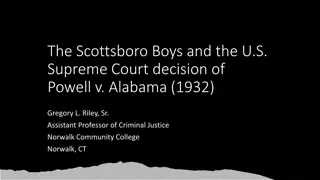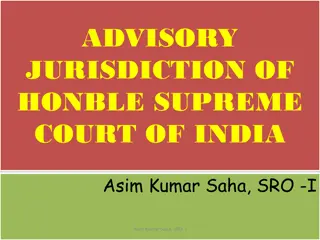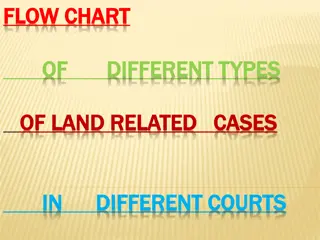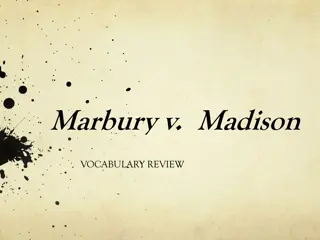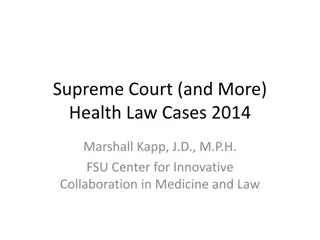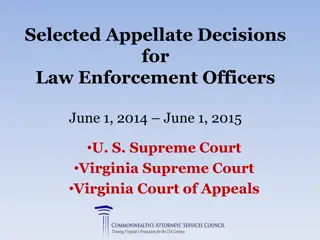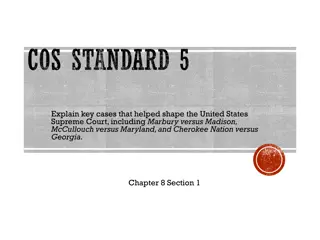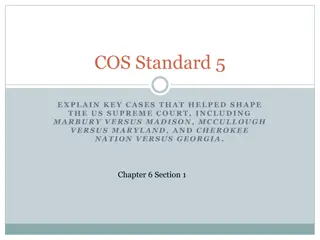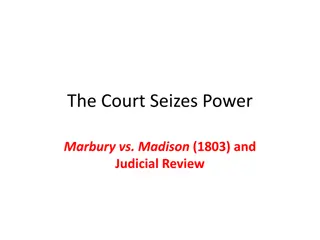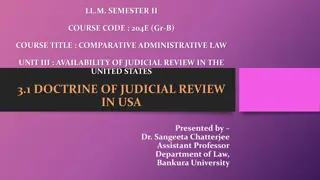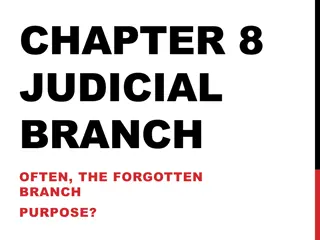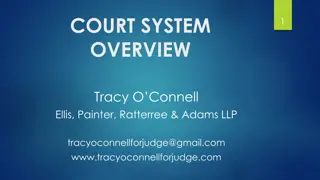Landmark Supreme Court Cases: Marbury v. Madison & McCulloch v. Maryland
Marbury v. Madison (1803) and McCulloch v. Maryland (1819) are two pivotal cases in Supreme Court history. Marbury v. Madison established judicial review, giving the Court the power to declare laws unconstitutional. McCulloch v. Maryland upheld federal supremacy over state laws. These cases exemplify the Court's role in interpreting the Constitution and defining the balance of power between branches of government.
Download Presentation

Please find below an Image/Link to download the presentation.
The content on the website is provided AS IS for your information and personal use only. It may not be sold, licensed, or shared on other websites without obtaining consent from the author. Download presentation by click this link. If you encounter any issues during the download, it is possible that the publisher has removed the file from their server.
E N D
Presentation Transcript
Supreme Court Landmark Decisions Crash Course: Supreme Court Procedures
FRQ Practice On the AP Government and Politics exam you will have 1 hour and 40 minutes to answer 4 FRQs. (Approximately 25 minutes each) Today you will practice writing a timed FRQ. You have 25 minutes to write your response to the Judicial Practice FRQ.
Focus on the Supreme Court Discussion: Do you think the Supreme Court oral arguments should be taped? Why or why not? Watch: Inside the Supreme Court https://www.youtube.com/watch?v=Unyswl36q8w
Landmark Supreme Court Cases Marbury v. Madison McCulloch v. Maryland
Marbury v. Madison (1803): Case Background Election of 1800 Thomas Jefferson and the Democratic- Republican Party replace John Adams and the Federalist Party Adams nominates dozens of federal judges but does not deliver all commissions Jefferson refuses to deliver them via James Madison when he takes office
Marbury v. Madison Constitutional Issue John Marbury petitioned the S.C. for a petition of mandamus to force Madison to deliver his commission. Could the Supreme Court force the Executive Branch to take such action?
Marbury v. Madison Questions Before the Court Was Marbury legally appointed? Yes Was the Judiciary Act of 1789 the law that gave the court power to issue a writ legal? NO
Marbury v. Madison The Rationale By declaring the Judiciary Act of 1789 unconstitutional, the Supreme Court established its right to review the actions of the other two branches.
McCulloch v. Maryland (1819) Case Background In 1816, Congress established the Second National Bank. States opposed the opening of branches throughout the country. In 1818, the state of Maryland passed legislation to impose taxes on the bank.
McCulloch v. Maryland Constitutional Issue Maryland passed a $1500 tax on the bank which James McCulloch of the Baltimore branch refused to pay. McCulloch was sued by MD and took his case to the Supreme Court
McCulloch v. Maryland Questions Before the Court Did the Congress have the power to establish a bank? Yes Did Maryland have the power to tax the National Bank? No
McCulloch v. Maryland The Rationale Supreme Court ruling base on the elastic and supremacy clauses. It could be deemed necessary and proper that Congress create a bank and because the national govt is supreme, MD had no right to tax it.
Landmark Cases Research Assignment Each of you will research 2 Landmark Cases create a PPT for your cases present in class on Monday, April 16. Your research MUST include the following: The year the cases was decided Key facts of the Case The Issue (or legal question) at hand Decision (made by the court) Rationale (why did the majority of the judges make this decision) Help us Remember it (a pneumonic device, rhyme, picture, story or something to help students remember the importance of this legislation)







